The Effects of Cannabis on the Teenage Brain
Cannabis is a psychoactive drug which is classified as a cannabinoid, coming from the Cannabis sativa or Cannabis indica plant.
Cannabis is also referred to by many other names, such as marijuana, grass, weed, dope, pot, mary jane, ganja, hash, and much more. It is often used for medicinal purposes, however, many people use it for recreational purposes.
It is one of the most frequently used illicit (in most countries) substances in the world.
What makes cannabis a psychoactive drug is its chemical content – THC or Tetrahydrocannabinol.
People use it in many different ways, either through smoking it by itself, with tobacco, or using pipes, and people also consume it directly with food in the form of ‘edibles’.
Regardless of how cannabis is consumed, subjects will experience similar physical and psychoactive effects.
Learn everything you need to know about how cannabis impacts the teenage brain by calling us on 0800 088 66 86
Symptoms of Cannabis Use

The symptoms of cannabis are varied, and include but are not limited to:
- Impaired memory
- Altered perceptions of reality
- Mood swings
- Depression and anxiety
- Paranoia
- Irritability
- Impaired coordination and motor skills
- Impaired problem-solving skills
- Coughing fits and higher amounts of phlegm leading to chest irritation
- Lung infections
- A compromised immune system
- Increased heart rate and blood pressure
- Suicidal thoughts (particularly among younger users)
Get the help you need to overcome cannabis addiction by calling us on 0800 088 66 86
What Does Cannabis Do to the Brain?
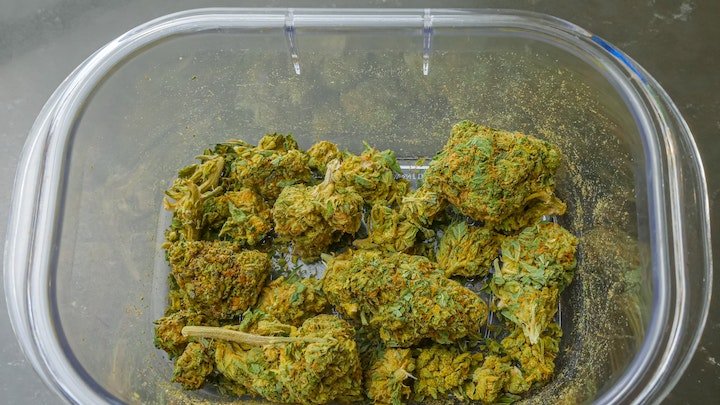
There are many short-term effects of cannabis, and these are the depressant effects which people typically chase in order to feel the ‘high’.
However, there are also plenty of long-term effects which can have adverse ramifications on someone’s psychological well-being later in life.
Cannabis is psychoactive, which means it has a range of psychological effects. It can affect its users both in the short term and also the long term.
Frequent and excessive consumption of cannabis can lead to the development of mental health issues such as depression, anxiety, paranoia, and more.
Studies show that parents who consumed cannabis regularly throughout their pregnancy had children who were suffering from cognitive impairments such as poor concentration, difficulties in memory, and reduced problem-solving skills.
Exposing young people – whether as a foetus or as a teenager – to cannabis frequently can have adverse effects on their psychological health.
Some studies have shown that young people (including teenagers) who were heavy users of cannabis displayed a significant disparity in connectivity [1] in areas of the brain which are responsible for memorisation and development, when compared to those who did not consume cannabis.
To learn more about precisely what cannabis does to the brain, give us a call on 0800 088 66 86
The Effects of Cannabis on the Teenage Brain: Comparing Early and Late Onset Cannabis Use

Studies show that there are striking differences in cognitive performance and IQ scores between frequent cannabis users who started consuming during their teen years [2] and those who had started consuming once they were in adulthood.
Despite growing in size during adolescence, the teen years are still imperative for one’s development of the brain.
It is thought that our brains do not stop developing until we are around 25 years of age, with the prefrontal cortex – the part of the brain which is located behind the forehead – being one of the last areas to reach full development.
The prefrontal cortex is responsible for helping people with their rationality, organisational skills, emotional regulation and more.
Furthermore, a younger and less developed brain – like that of a teenager – adapts to stress in a less effective way than an older and healthier adult would.
This leaves them more exposed to developing mental health issues such as anxiety and depression [3] which are induced by stress and traumatic events.
The effect of early onset cannabis consumption has profound effects on neurodevelopment. The aforementioned study Effects of Cannabis on the Adolescent Brain [2] details that those who started consuming cannabis as teenagers displayed slower reaction times, poorer memorisation abilities, worse impulse control, attention span, and more.
However, the same study also indicates that – to an extent – these deficiencies can be repaired through long-term abstinence.
Whether you’re suffering from the effects of early or late onset cannabis abuse, get the help you need by calling us on 0800 088 66 86
Prevalence of Cannabis Use Among Teenagers
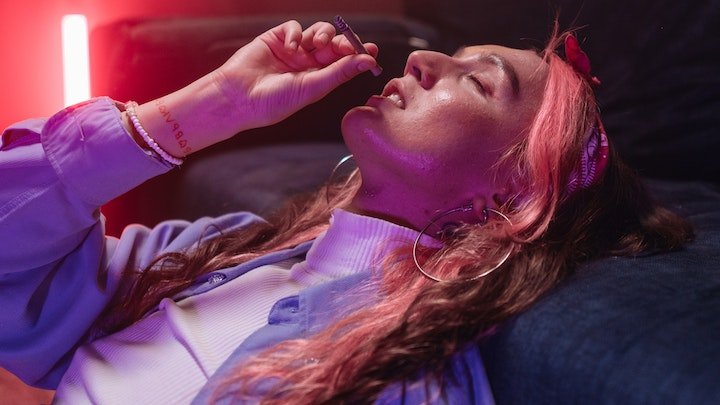
Cannabis is one of the most frequently used drugs worldwide and is often considered as a key ‘gateway’ drug.
The reason that it is often called a gateway drug is because it is seen as a more socially acceptable drug, or a drug which does not have as severe effects as other substances, such as heroin.
However, people often underestimate the effects it can have both in the short term and long term.
From 2021 to 2022, [4] there were 11,326 teenagers (the study only focused on young people under the age of 18) who were admitted into a drug and alcohol rehab due to a substance use disorder in the UK.
This was an increase from the previous year in the UK.
Of the 11,326 teenagers who entered a drug and alcohol rehab, it was found that cannabis was the most prevalent substance in which the patients were receiving treatment for.
In fact, 87% of teenagers at a drug and alcohol rehab in the UK were receiving treatment for cannabis addiction.
Furthermore, almost half of these teenagers admitted into rehab also required additional mental health treatment, reinforcing the mutually destructive relationship between mental health issues and cannabis use disorder.
Get help to beat cannabis addiction once and for all by giving our team a call on 0800 088 66 86
Why is a Teenager’s Brain More Exposed to Addiction?

The disease model of addiction [5] and other models of neuroscience reveal to us how cannabis – and other addictive substances – have a profound effect on shaping our cognitive and behavioural patterns.
In our brains are reward pathways called ‘mesolimbic pathways’. These pathways are dopaminergic, which means they are responsible for releasing dopamine in the brain – the “feel good” hormone.
We experience dopamine when we eat, exercise, laugh, have sexual intercourse, and also when we consume addictive substances such as drugs or alcohol.
Drugs and alcohol can release a significant amount of dopamine, activating these feelings of euphoria.
This will essentially activate our desire for reward – in this case, the euphoria associated with drugs and alcohol.
When someone consumes drugs and alcohol excessively, triggering these dopamine releases in great intensities, it will make the person become dependent on these substances in order to experience pleasure.
Activities which were previously “dopaminergic” or pleasurable and euphoric will pale in comparison to the levels of dopamine released when consuming addictive substances.
The reward pathways of a teenage brain are far more pliable and easily manipulated than an older and healthier person’s brain.
This is because their brain is still developing. So, when a teenager frequently consumes cannabis, they are much more likely to develop an addiction because their reward pathways are more pliable.
Don’t let cannabis abuse do serious damage – get help to overcome it today by calling us on 0800 088 66 86
The Link Between Cannabis and Mental Health Issues
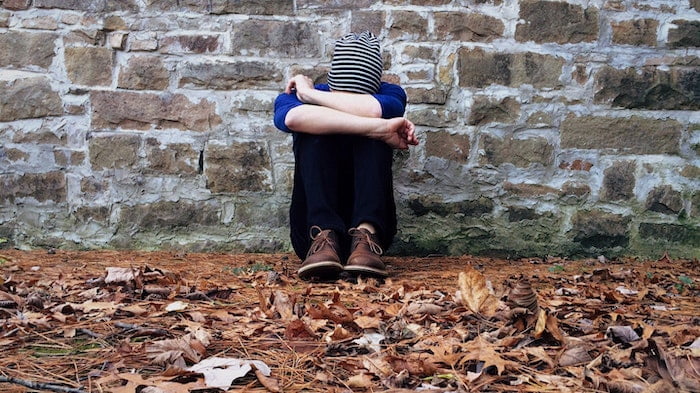
Some studies show that there is a relationship between cannabis consumption and the development or exacerbation of mental health issues such as anxiety, depression, bipolar disorder, schizophrenia, and more.
When taking into account that the teenage brain is still developing, this makes them more susceptible to developing mental health issues.
Studies also show a link between cannabis and earlier onset of psychosis [6] in those who have genetic predispositions to psychotic disorders such as schizophrenia.
It can be argued that there is a mutually destructive relationship between cannabis and mental health issues.
This is because many people who are already suffering from mental health issues such as anxiety, depression, and more turn towards cannabis consumption as a form of self-medicating.
As a result, they may begin to suffer from cannabis withdrawal symptoms which further exacerbate their existing mental issues, creating a continuous cycle of withdrawal and relapsing.
Furthermore, there is evidence to suggest that cannabis leads to poorer mental health. [7]
Although it is common for users of cannabis to experience short-term psychosis, where their perception of reality is distorted, they also risk exposing themselves to the development of long-term health issues such as schizophrenia, where their perception of reality is distorted on a much more extreme scale.
Get help for both cannabis addiction and mental health issues by calling us today on 0800 088 66 86
Other Factors Which Contribute to Cannabis Addiction Among Teenagers
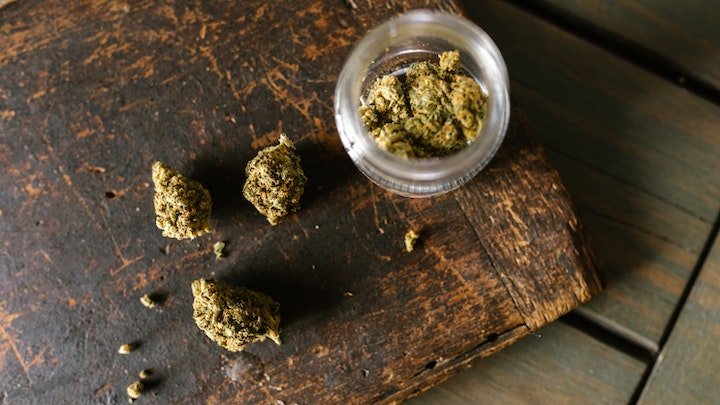
There are other holistic issues which may mean that the teenager is more exposed to developing a cannabis use disorder.
There is an emphasis on the development of social and behavioural changes in the brain during the teenage years.
Teenagers are forming new relationships, adapting to their environments, and are exercising more independence which makes them more autonomous when it comes to developing habits.
The need for external validation due to factors such as peer pressure can mean that a teenager smokes cannabis and takes part in binge drinking simply because their peers or social circle encourages that form of behaviour.
Normalising this form of behaviour and the effects which come with it makes it more ingrained into the teenager’s perception of what is normal.
Furthermore, the lack of sleep [8] which many teenagers get will also have an effect on their behaviour and also their physiological response to drug and alcohol consumption.
A reduction in sleep quality and quantity can leave teenagers far more susceptible to developing mental health issues such as anxiety, and cognitive impairments such as reduced memorisation, irritability, and emotional regulation.
What makes this even more destructive is that although cannabis makes people feel more relaxed, drowsy, and sleepy, making them believe that their sleep will be better, it actually interferes with their sleep quality drastically.
Cannabis and alcohol severely reduce the quality of sleep by reducing the amount of time that the person spends in REM, or the Rapid Eye Movement stage of sleep.
REM sleep is highly important as it helps facilitate emotional processing and regulation, memorisation, skill development, dreams, and so on.
Often, people who abstain from cannabis experience very vivid dreams during the first few weeks because their brain is making up for the lack of REM sleep that they were previously getting.
To learn more about the various factors that can cause cannabis addiction amongst teenagers, give our team a call on 0800 088 66 86
How to Treat Cannabis Use Disorder if You’re a Teenager or Young Person
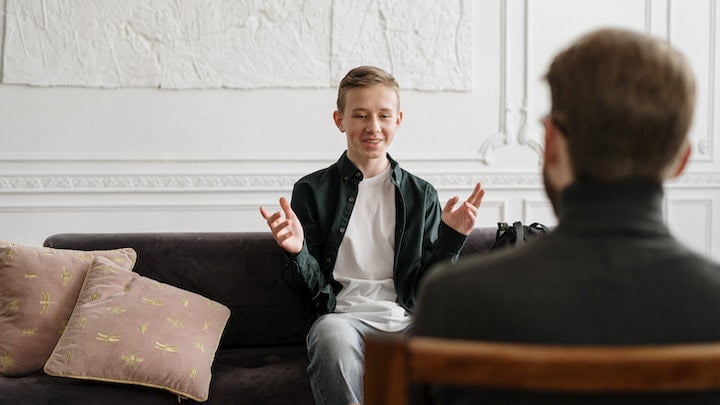
A young person or a teenager who is suffering from a cannabis addiction would follow a similar procedure that an older addicted person would when entering a cannabis rehab.
This means that they will undergo an assessment in order to enter a drug and alcohol rehab.
However, teenagers and younger patients can enter a drug and alcohol rehab which is specifically catered to younger people in order to optimise their recovery.
A drug and alcohol rehab for teenagers and young people will follow a similar programme structure to a traditional addiction treatment programme, however there will be some key differences which accommodate the young person’s needs.
An addiction treatment programme for a teenager will place much more emphasis on cognitive behavioural therapy, family therapy and counselling, and more holistic treatment methods over medically assisted therapy.
While medically assisted therapy is useful and important for some patients, a younger patient’s brain is still developing and may need to steer clear from medication which may actually be addictive itself.
The emphasis on family therapy is imperative throughout the young person’s addiction treatment.
This is because family therapy can come in a wide range of forms and address a wide range of issues.
Family therapy can achieve the following benefits:
- Improving family dynamics: Poor relationships between family members may contribute towards poorer mental health among family members, and this can create a more dysfunctional family dynamic. Family Behaviour Therapy and Multidimensional Family Therapy can help improve the dynamic and support networks within families.
- Improve communication between family members: Helping not only the young patient communicate their unique needs, but helping parents and other family members communicate their concerns or thoughts with the addicted person can help create a more constructive support network.
- Create a more hospitable family environment: Toxic behavioural patterns can expose children and family members to addiction, therefore, it is important to help family members understand if they exhibit some unhealthy behavioural patterns which expose their loved one to addiction.
- Educate family members on the complexities of addiction: Addiction is a complex subject, and many people are unaware of the addiction treatment process. Family therapy will help family members understand how the young patient will undergo recovery and how they can help support their recovery in the future.
Get the support you need to properly treat your cannabis addiction with a call to our expert team on 0800 088 66 86
Intervention for a Teenager Addicted to Cannabis

It is often the case that the loved one of the addicted person reaches out and brings forward the idea of seeking treatment.
An intervention may be required if the young person or teenager is reluctant to seek help for their cannabis use disorder.
An intervention is where people who are close to the addicted person gather in a non-judgemental and non-confrontational space in order to share how their loved one’s addiction is affecting them.
However, an intervention shouldn’t be hosted spontaneously
When hosting an intervention, it is best done in the presence of a licensed interventionist who is experienced and can navigate different family dynamics and productive discussions.
The licensed interventionist will help with a wide range of factors which will ensure that the intervention is facilitated in an optimal fashion, including but not limited to:
- Coordinating a date, time, and location: The licensed interventionist will take care of basic details such as organising the intervention at a convenient date, time, and a suitable location for the participants and the addicted teenager.
- Educating participants about the rehab process: Addiction can be scary, and not many people understand the recovery process. The licensed interventionist will educate the friends and family members of the addicted teenager about the addiction treatment process, what it consists of, and how they can become an effective support network.
- Selecting participants: The interventionist will need to ensure that those who are present at the intervention have a close relationship with the addicted teeanger, and also that they will not arouse negative emotions or conflict at the intervention.
- Facilitating rehearsals: It can be hard to articulate your thoughts and emotions in front of the person whose behaviour is troubling you. The interventionist will help participants prepare through writing and speaking rehearsals. This will give them more confidence and they’ll be more effective when the time comes to share their thoughts.
- Planning for rejection: While interventions are more often than not successful, they do not always go to plan. Because of this, it is important that the licensed intervention has a thought-out plan in place in the event of a rejection.
For help conducting an intervention for a teenager, or for any other support or information you might need to overcome cannabis addiction, give our expert team a call today on 0800 088 66 86
References
[1] https://www.hazeldenbettyford.org/addiction/marijuana-symptoms
[2] https://www.ncbi.nlm.nih.gov/pmc/articles/PMC3930618/
[3] https://www.nimh.nih.gov/health/publications/the-teen-brain-7-things-to-know
[5] https://www.ncbi.nlm.nih.gov/pmc/articles/PMC8357831/
[8] https://www.sleepfoundation.org/sleep-deprivation/lack-of-sleep-and-cognitive-impairment




